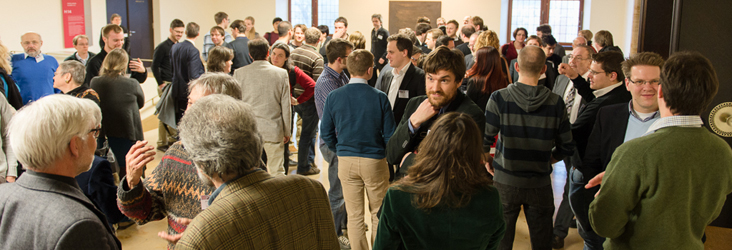
Events 2020
The Interdisciplinary Center for Scientific Computing (IWR) and its affiliated institutions organize a large number of workshops, conferences and other events for discussing latest scientific results as well as identifing upcoming challenges in the field of Scientific Computing. In addition the IWR regularly hosts events which emphasis on broadening and improving the interdisciplinary dialogue.
2020
[January][February][March] [April] [May] [June] [July] [August] [September] [October] [November] [December]
December
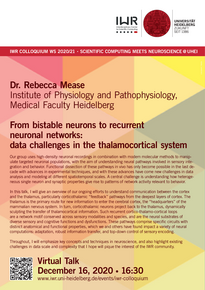
IWR Colloquium Winter Semester 2020/2021
"From bistable neurons to recurrent neuronal networks: data challenges in the thalamocortical system"
Dr. Rebecca Mease • Institute of Physiology and Pathophysiology, Medical Faculty Heidelberg
December 16, 2020 • 16:30 • Virtual Talk
Our group uses high-density neuronal recordings in combination with modern molecular methods to manipulate targeted neuronal populations, with the aim of understanding neural pathways involved in sensory integration and behavior. Functional dissection of these pathways in vivo has only become possible in the last decade with advances in experimental techniques, and with these advances have come new challenges in data analysis and modeling at different spatiotemporal scales. A central challenge is understanding how heterogeneous single neuron and synaptic properties give rise to patterns of network activity relevant to behavior.
In this talk, I will give an overview of our ongoing efforts to understand communication between the cortex and the thalamus, particularly corticothalamic "feedback" pathways from the deepest layers of cortex. The thalamus is the primary route for new information to enter the cerebral cortex, the "headquarters" of the mammalian nervous system. In turn, corticothalamic neurons project back to the thalamus, dynamically sculpting the transfer of thalamocortical information. Such recurrent cortico-thalamo-cortical loops are a network motif conserved across sensory modalities and species, and are the neural substrates of diverse sensory and cognitive functions and dysfunctions. These pathways comprise specific circuits with distinct anatomical and functional properties, which we and others have found impact a variety of neural computations: adaptation, robust information transfer, and top-down control of sensory encoding.
Throughout, I will emphasize key concepts and techniques in neuroscience, and also highlight existing challenges in data scale and complexity that I hope will pique the interest of the IWR community.
This virtual talk will be held via ZOOM. For more information please visit the webpage of the IWR Colloquium.
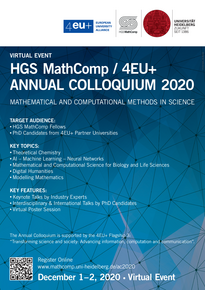
HGS MathComp / 4EU+ Annual Colloquium 2020
"Mathematical and Computational Methods in Science"
December 1-2, 2020 • Virtual Event
Target Audience
- HGS MathComp Fellows
- PhD Candidates from 4EU+ Partner Universities
Key Topics
- Theoretical Chemistry
- AI - Machine Learning - Neuronal Networks
- Mathematical and Computational Science for Biology and Life Sciences
- Digital Humanities
- Modelling Mathematics
Key Features
- Keynote Talks by Industry Experts
- Interdisciplinary & International Talks by PhD Candidates
- Virtual Poster Session
The Annual Colloquium is supported by the 4EU+ Flagship 3: "Transforming science and society: Advancing information, computation and communication".
Register Online: [HGS MathComp / 4EU+ Annual Colloquium 2020 Registration]
! Registration required ! (Deadline: October 22, 2020)
September
4EU+ School @ IWR
"Mathematical and Computational Methods for Challenging Applications"
September 21-25, 2020 • Heidelberg, Germany
Modern application problems in the sciences rely heavily on data processing and modeling of systems and dynamics. The development of new and improved methods in mathematics and computer science aim to provide the tools and the theoretical background for these methods.
This 4EU+ summer school gives insights into several areas were current research heavily influences method development. Participants will get short, precise and high-powered introductions into several research fields. The aim is to provide the first step for young researchers to extend their toolbox of methods and learn some new, powerful and rewarding technique.
The school aims at master and PhD students from the fields of mathematics and computer science as well as students with an interdisciplinary background in computational science applications. Each lecture block will take the participants from the general education level into a small specialization topic to get a first insight into a new subtopic that will help them to extend their knowledge on theory and methods.
The 4EU+ alliance aims to take education to a next, a European level. With its four flagships, the alliance tackles large questions in research that have fundamental impact on our societies and the way we live, learn and develop. Flagship 3, “Transforming science and society: Advancing information, computation and communication” is coordinated by Heidelberg University. Our summer schools are meant to be platforms to get in touch with 4EU+ and to share our vision of modern education.
The school will be held in Heidelberg (Germany). If the situation in regard to COVID-19 makes this impossible, the school will be shifted to a digital format.
Target Audience
Postgraduate students, PhD candidates, postdocs and young researchers:
- from the fields of mathematics and computer science as well as students with an interdisciplinary background in computational science applications.
- Master students from Heidelberg University
Speakers
The 4EU+ school 2020 is taught in a series of courses and single lectures by:
- Helle Sørensen, University of Copenhagen
- Filip Sadlo, Heidelberg University
- Ivano Eberini, University of Milan
- Wanda Niemyska, University of Warsaw
- Julien Tierny, Sorbonne University
! Registration required ! (Deadline: July 29, 2020)
The 4EU+ School @ IWR is part of the activities of the 4EU+ Flagship 3: "Transforming science and society: Advancing information, computation and communication".
Location: Mathematikon • Im Neuenheimer Feld 205 • 69120 Heidelberg, Germany
July
75. Heidelberger Bildverarbeitungsforum
"Bildverarbeitungsalgorithmen: Von Low-Level bis Deep Learning"
7. Juli 2020 • Veranstaltung Online
Im Zeitalter des Maschinellen Lernens werden die Fortschritte in den anderen Bereichen der Bildverarbeitung schnell übersehen. Daher wird das 75. Heidelberger Bildverarbeitungsforum die Fortschritte in allen Bereichen der Bildverarbeitungsalgorithmik vorstellen mit Fokus auf das Zusammenwirken von allen Komponenten, da ein Kette nur so stark ist wie ihr schwächstes Glied. Ein weiterer Schwerpunkt ist die Frage, wie Lernverfahren praxistauglich und zuverlässig - in anderen Worten mathematisch fundiert - werden können.
Erstmals wird das Forum online stattfinden. Alle geschätzten Merkmale des Forums bleiben erhalten oder werden sogar noch besser: von einem virtuellen Gastgeber passend zum Schwerpunktthema, den man besser kennen lernen kann, hochqualitativen Vorträgen mit Diskussion bis zu einer virtuellen Ausstellung, die Gespräche mit den Ausstellern der Exponate ermöglicht. Hier gibt es eine wichtige Änderung, um das Forum zielgerechter durchzuführen: alle virtuellen Exponate sollten auf das Schwerpunktthema abgestimmt sein.
Durch die Online-Veranstaltung sparen alle Teilnehmer Zeit und Kosten für die Anreise und können die aufgezeichneten Vorträge auch noch nachträglich hören. Ausstellern bietet das Forum in Zeiten ausgefallener Messen die einmalige Gelegenheit genau der richtigen und interessierten Zielgruppe ihre zum Schwerpunktthema passenden Neuentwicklungen vorzustellen. Genauere Angaben zu den Möglichkeiten der virtuellen Ausstellung finden Aussteller auf der Anmeldeseite des Forums.
March
HAIlights
"Von Gilgamesch und Gigamesh - 3D-Einmessung archäologischer Objekte"
Dr. Hubert Mara, IWR
!!! Veranstaltung ist auf unbestimmte Zeit verschoben !!!
Die Aufnahme, Speicherung und Weitergabe großer Mengen von Daten ist eine Aufgabe, der sich menschliche Gesellschaften bereits seit Jahrtausenden zu stellen haben. Einen der größten Meilensteine bildet dabei die Erfindung der Schrift, zuerst nachweisbar im Mesopotamien des 4. vorchristlichen Jahrtausends. Zeugnisse dieses Quantensprungs finden sich unter anderem in der Heidelberger Uruk-Warka-Sammlung, die spektakuläre Funde aus dem Sitz des mythischen Königs Gilgamesch bewahrt. Diese Objekte zeugen jedoch nicht nur von den Leistungen antiker Archivare, sie stellen auch eine Herausforderung für ihre modernen Nachfolger dar. Mit welchen Methoden lassen sich archäologische Daten heute sammeln, bewahren und austauschen?
Antworten darauf liefert das Heidelberger "Forensic Computational Geometry Labratory" (FCGL), an dem Methoden zur Digitalisierung archäologischer Artefakte entwickelt werden. Mittels eines Laserscanners werden die Objekte aufgenommen und über das Programm Gigamesh in digitale 3D-Modelle umgesetzt. Unter anderem kommt dieses Verfahren im Projekt "Scanning for Syria" zum Einsatz, in dessen Zentrum die Sicherung von durch den syrischen Bürgerkrieg bedrohten Kulturgütern steht. Das HAIlight im März bietet Ihnen die Gelegenheit, den Forschern am FCGL bei ihrer Arbeit mit Objekten der Uruk-Warka-Sammlung über die Schulter zu schauen.
Das HAIlight findet am Freitag, den 27.03.2020 um 18:00 Uhr statt und dauert ca. eineinhalb bis zwei Stunden. Die Plätze für die Teilnahme sind begrenzt und werden nach Ablauf der Rückmeldefrist verlost. Details zu Treffpunkt und Veranstaltungsort erhalten Sie in der Teilnahmebestätigung.
Für die Platzvergabe schicken Sie uns bitte bis spätestens Montag, 16.03.2020 unter Angabe Ihres Namens eine E-Mail an hailight@alumni.uni-heidelberg.de. Begleitpersonen können dann teilnehmen, wenn nach Berücksichtigung aller interessierten HAI-Mitglieder noch freie Plätze zur Verfügung stehen. Geben Sie daher bitte auch an, ob es sich bei Ihrer Begleitung um ein Mitglied handelt. Vielen Dank für Ihr Verständnis.
Veranstaltungsort: Mathematikon • Konferenzraum / 5. Stock • Im Neuenheimer Feld 205 • 69120 Heidelberg
Summer School
RTG Big Data Research Summer School at IIT Guwahati
IWR & IIT Guwahati
!!! Postponed until Autumn 2020 !!!
The IIT Guwahati and the Interdisciplinary Center for Scientific Computing (IWR) of Heidelberg University jointly organize the 2nd RTG Big Data Research Summer School 2020. The event will take place from March 23–27, 2020 at one of the most prestigious institutes in in India — IIT Guwahati. The summer school is aimed at advanced master students and PhD students with a background in scientific computing and mathematics.
Renowned experts will hold lectures and seminars on up to date topics and state of the art methods in big data computing and mathematics. The speakers will be researchers predominately from India and Heidelberg University, Germany. Participating students will actively discuss with the experts, solve problems during workshop sessions and some will have the opportunity to present their own research. This provides unique opportunities to the students to hone their skills.
Location: IIT Guwahati, India
February
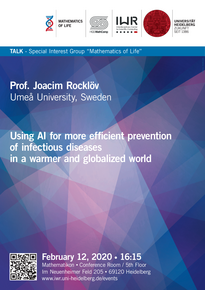
Talk / Special Interest Group “Mathematics of Life”
"Using AI for more efficient prevention of infectious diseases in a warmer and globalized world"
Prof. Joacim Rocklöv • Umeå University, Sweden
February 12, 2020 • 16:15
Climate change, increasing human mobility and trade, pathogen evolution and resistance, urbanization, and ecological range shifts - all these global factors destabilize the current pattern of infectious diseases, notably those transmitted by vectors. There is general agreement that this will lead to the emergence and re-emergence of a wide range of infectious diseases. In Europe, water and vector-borne diseases such as Vibriosis, Dengue, Chikungunya, West Nile Virus, Lyme disease and Tick-borne encephalitis are proliferating and emerging among previously immunologically naive populations. This may result in severe disease outbreaks, morbidity, mortality, long-term disability and increasing burdens of disease. In Low-and-Middle-Income Countries (LMICs), Ebola has not yet been contained, malaria, Dengue and cholera are still associated with massive disease burdens, and arboviruses are likewise on the rise. Globally, resistance to antibiotics and insecticides is a growing concern. New genotypes and new pathogens are threatening to unleash pandemics with potential to have major societal impact, if not effectively monitored and controlled. The recent Corona virus situation is a good example of how sensitive the global population is to local emergence of viruses with epidemic potential. Achieving the sustainable development goals 2030 requires new methods for monitoring, surveillance and analysis, all of which are key for the deployment of more efficient, timely and strategic prevention.
To address these unprecedented global challenges, the public health professions are called on to develop new approaches and innovative techniques and solutions. We are now entering a world, where increasing availability of high quality, high-dimensional data and advanced computation techniques allow for previously unimaginable levels of precision and granularity with respect to monitoring and forecasting of disease outbreaks, their associated burdens and intervention demands. Digitalization, machine learning and artificial intelligence are still in its infancy in terms of public health applications, but hold great promise for revolutionizing public health decision-making, and for sustaining and safeguarding the global population.
This talk provides a few examples on how data from many different disciplines and domains, including climate, human mobility and social media, can be integrated in machine learning, and help timely risk assessment, better forecasts and support the development of more effective prevention strategies. In the talk I will discuss the methods, findings and give examples of tangible decision tools in the making in collaboration with public health policy makers.
“Mathematics of Life” is a special interest group organized by doctoral students of the HGS MathComp.
Location: Mathematikon • Conference Room, Room 5/104, 5th Floor • Im Neuenheimer Feld 205 • 69120 Heidelberg
January
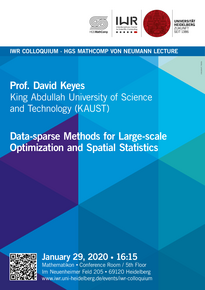
IWR Colloquium Winter Semester 2019/ 2020 & HGS MathComp Von Neumann Lecture
"Data-sparse Methods for Large-scale Optimization and Spatial Statistics"
Prof. David Keyes • King Abdullah University of Science and Technology (KAUST)
January 22, 2020 • 16:15
A traditional goal of algorithmic optimality, squeezing out flops, has been superseded because of evolution in architecture. Flops no longer serve as a reasonable proxy for all aspects of complexity. Instead, algorithms must now squeeze memory, data transfers, and synchronizations, while extra flops on locally cached data represent only small costs in time and energy. Hierarchically low-rank matrices realize a rarely achieved combination of optimal storage complexity and high-computational intensity in approximating a wide class of formally dense linear operators that arise in applications for which exascale computers are being constructed. They may be regarded as algebraic generalizations of the fast multipole method. Methods based on these hierarchical data structures and their simpler cousins, tile low-rank matrices, are well proportioned for early exascale computer architectures, which are provisioned for high processing power relative to memory capacity and memory bandwidth. Hierarchically low-rank matrices are ushering in a renaissance of computational linear algebra. A challenge is that emerging hardware architecture possesses hierarchies of its own that do not generally align with those of a given algorithm-application pair. We describe modules of a software toolkit, hierarchical computations on manycore architectures (HiCMA), that illustrate these features and are intended as building blocks of applications, such as matrix-free higher-order methods in optimization and large-scale spatial statistics. Some modules of this open-source project have been adopted in the software libraries of major vendors.
Biography:
David Keyes directs the Extreme Computing Research Center at the King Abdullah University of Science and Technology (KAUST), where he was the founding Dean of the Division of Mathematical and Computer Sciences and Engineering in 2009 and currently serves in the Office of the President as Senior Associate for strategic priorities and institutional partnerships.
He works at the interface between parallel computing and partial differential equations and statistics, with a current focus on scalable algorithms exploiting data sparsity.
Before joining KAUST he led multi-institutional scalable solver software projects in the SciDAC and ASCI programs of the US DOE, ran university collaboration programs at US Department of Energy and NASA academic collaboration institutes, and taught at Columbia, Old Dominion, and Yale Universities.
He is a Fellow of SIAM, AMS, and AAAS, and has been awarded the ACM Gordon Bell Prize, the IEEE Sidney Fernbach Award, and the SIAM Prize for Distinguished Service to the Profession.
He earned a BSE in Aerospace and Mechanical Sciences from Princeton in 1978 and a PhD in Applied Mathematics from Harvard in 1984.
Location: Mathematikon • Conference Room, Room 5/104, 5th Floor • Im Neuenheimer Feld 205 • 69120 Heidelberg
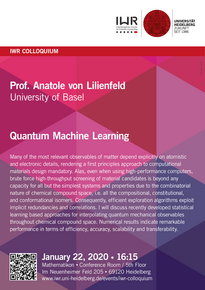
IWR Colloquium Winter Semester 2019/ 2020
"Quantum Machine Learning"
Prof. Anatole von Lilienfeld • University of Basel
January 22, 2020 • 16:15
Many of the most relevant observables of matter depend explicitly on atomistic and electronic details, rendering a first principles approach to computational materials design mandatory. Alas, even when using high-performance computers, brute force high-throughput screening of material candidates is beyond any capacity for all but the simplest systems and properties due to the combinatorial nature of chemical compound space, i.e. all the compositional, constitutional, and conformational isomers. Consequently, efficient exploration algorithms exploit implicit redundancies and correlations. I will discuss recently developed statistical learning based approaches for interpolating quantum mechanical observables throughout chemical compound space. Numerical results indicate remarkable performance in terms of efficiency, accuracy, scalability and transferability.
Location: Mathematikon • Conference Room, Room 5/104, 5th Floor • Im Neuenheimer Feld 205 • 69120 Heidelberg
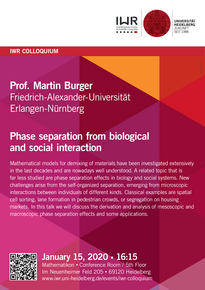
IWR Colloquium Winter Semester 2019/ 2020
"Phase separation from biological and social interaction"
Prof. Martin Burger • Friedrich-Alexander-Universität Erlangen-Nürnberg
January 15, 2020 • 16:15
Mathematical models for demixing of materials have been investigated extensively in the last decades and are nowadays well understood. A related topic that is far less studied are phase separation effects in biology and social systems. New challenges arise from the self-organized separation, emerging from microscopic interactions between individuals of different kinds. Classical examples are spatial cell sorting, lane formation in pedestrian crowds, or segregation on housing markets. In this talk we will discuss the derivation and analysis of mesoscopic and macroscopic phase separation effects and some applications.
Location: Mathematikon • Conference Room, Room 5/104, 5th Floor • Im Neuenheimer Feld 205 • 69120 Heidelberg
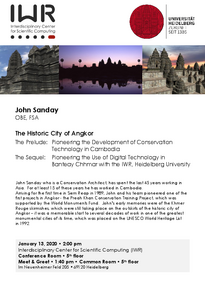
Talk
"The Historic City of Angkor"
The Prelude: Pioneering the Development of Conservation Technology in Cambodia
The Sequel: Pioneering the Use of Digital Technology in Banteay Chhmar with the IWR, Heidelberg University
John Sanday • OBE, FSA
January 13, 2020 • 14:00
John Sanday who is a Conservation Architect, has spent the last 45 years working in Asia. For at least 15 of these years he has worked in Cambodia. Arriving for the first time in Siem Reap in 1989, John and his team pioneered one of the first projects in Angkor - the Preah Khan Conservation Training Project which was supported by the World Monuments Fund. John’s early memories were of the Khmer Rouge skirmishes which were still taking place on the outskirts of the historic city of Angkor – it was a memorable start to several decades of work in one of the greatest monumental cities of its time, which was placed on the UNESCO World Heritage List in 1992.
In the first part of his talk, John will describe his early days of setting up the first major conservation-training programme in the 12th Century Buddhist monastic complex of Preah Khan. He will talk about some of the problems they had to face and the techniques developed in Preah Khan and three other sites in Angkor. There will be illustrations showing Angkor as John found it in the 1990’s and it will set the background for him to side track to another major Khmer site in the far North of Cambodia.
John will dedicate the second half of his talk to one of the lesser known but highly significant Khmer sites known as Banteay Chhmar, which is closely linked to Angkor. This 12th Century Buddhist, monastic complex stylistically emulates the temples in Angkor and belongs to the Bayon period. Banteay Chhmar became John´s link with IWR and its team. John and Hans Georg Bock had been fantasizing for many years on trying to link heritage conservation with applied mathematics. Here in Banteay Chhmar, they initiated an extraordinary project and a way of using ‘state of the art’ technology to digitally reconstruct iconic face tower as well as sections of the enclosure wall with its exquisite bas-relief carvings. Precise dimensions of hundreds of stone blocks were recorded digitally to recreate the tower, which had to be dismantled and rebuilt, as well as the fallen stones of the bas relief as the first step to their reconstruction.
Khmer architect Dr. Pheakdey Nguonphan (Royal University of Phnom Penh) and Dr. Anja Schäfer (IWR) developed the digital technology and formed a multi-disciplinary research team including stone masons from Preah Khan. John will describe the system, that was developed to solve “John’s Puzzle” and illustrate how the stones began to recognize their original positions in the structures, without having to move the stones manually.
There will be time for questions and discussion at the end.
! Meet & Greet: 13:40 • Mathematikon • Common Room, 5th Floor !
Location: Mathematikon • Conference Room, Room 5/104, 5th Floor • Im Neuenheimer Feld 205 • 69120 Heidelberg